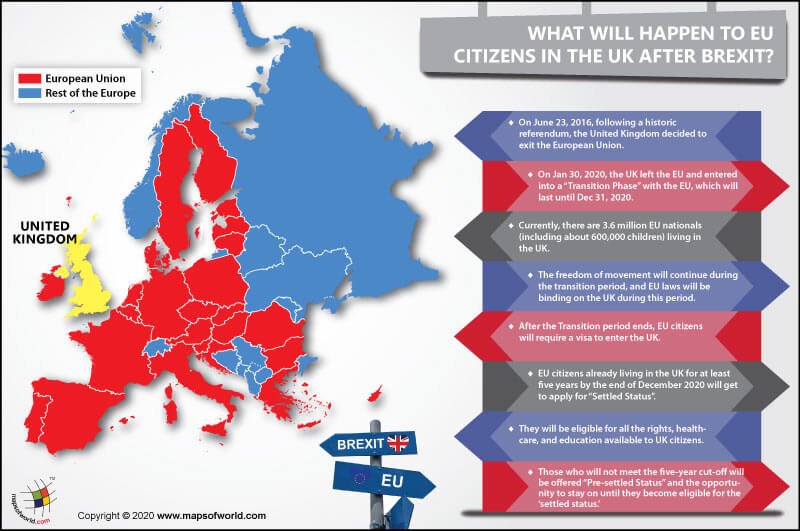

Map of Europe depicting the European Union Countries and the rest of Europe
On June 23, 2016, following a historic referendum, the United Kingdom decided to exit the European Union – an association or partnership of European nations that allow the EU to function as a single market. UK Prime Minister triggered Article 50 of the Treaty of Lisbon on March 29, 2017, which gave the state two years to renegotiate the terms of this Brexit by March 31, 2019. One of many vital details was how the UK would deal with the European Union’s terms that allowed EU citizens to travel across, reside freely, work in the UK, and vice versa.
By December 2018, 3.6 million EU citizens were living in the UK, and since March 2017, they have been living under a shadow of constant anxiety. Adding to the confusion were news reports claiming that EU citizens will need to register for an identification card and provide biometric information.
Quelling speculations, then UK PM Theresa May had reassured EU citizens living in the country that the offer she had made during the European Council Summit in June 2017 was a very fair one and would protect citizens’ rights. Current plans include offering ‘settled status’ to EU citizens living in the UK for over five years.
This means that they will be eligible for all the rights, healthcare, and education available to UK citizens. Those who will not meet the five-year cut-off will be offered the opportunity to stay on until they become eligible for the ‘settled status.’ The cut-off date for these five years is not known as negotiations between the UK, and the EU are still ongoing. These plans, however, are contingent upon the EU offering a similar deal to UK ex-pats living elsewhere in the EU, PM May had affirmed. Such UK nationals numbered around 785,000 in December 2018.
citizens in the UK continue to remain jittery despite the UK government’s earlier reassurances and are deeply concerned over the outcome of the negotiations. The new government headed by PM Boris Johnson that assumed charge on July 24, 2019, has avoided any mention of new legislation to guarantee EU nationals’ rights and just made verbal promises.
Many EU residents have decided to apply for UK citizenship to avert any unpleasant outcome. According to news reports from late August 2017, the UK Home Office has received approximately 28,502 applications from EU nationals seeking UK citizenship (between July 2016 and June 2017). This is an 80% increase from the applications (of EU citizens in the UK) in 2015-16.
There are 3.6 million EU nationals (including about 600,000 children) living in the UK. Their legal status will become clear only when the negotiations between the UK and the EU are finalized, but it is unlikely that there could be a mass exodus over the Brexit.
The UK officially finally decided to leave the EU on January 31, 2020, after various discussions on the withdrawal agreement between the European Commission and the UK government in the past few years. Both houses of the British parliament accepted the agreement in January 2020.
The withdrawal agreement guarantees EU citizens and their family members to live, study, work, and travel to the UK during the transition period. The agreement would protect EU citizens living in the United Kingdom. UK nationals will get full protection residing in any EU Member States at the end of the transition period.
As per the agreement, EU citizens, including their family members in the UK and Britons in the EU, have retained residency and social security rights after Brexit. But the freedom to reside within the EU and UK will remain until the transition period. The transition period will be ended on December 31, 2020.
EU citizens and their families who have been residing in the UK for five years by the end of December 2020 have to apply for “settled status.” It will give them the right to live and work in the UK indefinitely.
Related Link:
Related Maps:
The Republic of Madagascar is an island country located in the Indian Ocean, off the…
The Euro is the official currency of the European Union. It is, however, not incumbent…
There are many countries or regions that are partially recognized by the UN, have disputes…
The Alaska Statehood Act was signed into law by President Dwight D. Eisenhower in 1958,…
The name Persia may, however, only be used to refer to Iran in some contexts.…
Hawaii is an Island State in the US. It is one of the 50 states…